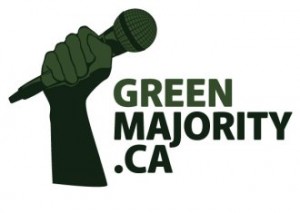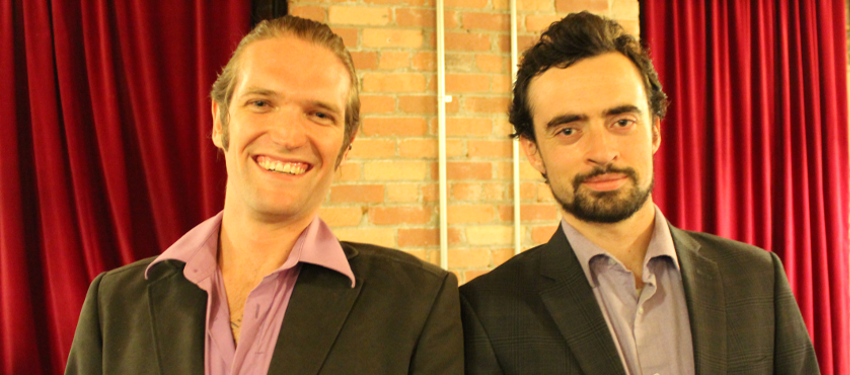Daryn Caister is host of environmental radio program and video channel, the Green Majority. Daryn is one of those truly rare creatures; an independent, investigative journalist intent on the truth. Unfettered by corporate sponsorship, he is able to help us understand the systems that result in the environmental disasters we find ourselves in and how to go about changing them. We recently had the privilege of sharing some of his thoughts, theories and strategies for the future.
What draws you to environmental journalism?
I wouldn’t do a traditional media job is because those people are actors more than they are journalists. They are just a conduit for someone else’s information. For me, it’s never been about being in the spotlight; it matters to me that I change someone’s minds.
What do you want to change people’s minds about?
The importance of the environment. I’m not trying to convince people of my world view. My word view isn’t required for me to be right because I am asking you to consider new information that we disseminate through our shows. I’m not telling them what to think about it and I think that’s a critical difference between what we do and what most people do.
What you choose to do with those facts is up to you, but there’s just so many things that are objective facts that people don’t consider and I see that as my job. I see myself as step 1 which is that you have to accept these facts as true.
Most environmental groups are saying; “Hey person who already cares about the environment, here’s something you should care about this week.” It’s like having a company where all your sales people are focused on post-sales follow up and no one is getting new sales. I think that’s what’s wrong with the environmental movement; it only focuses on those people who are already concerned about the environment and there’s only so much that this group of people can take action on. I really feel like we are the only people who are going out and trying to make new converts.
What is your strategy for reaching new converts?
Always speak their language. The first thing that I would recommend to anyone who wants to  be an environmental activist is to take first year economics or you will be significantly restricting your ability to communicate. When they look at environmentalism, their first question is: “What will this cost me?” Perhaps they are emotionally convinced that climate change is something we should take action on, but they aren’t going to vote for a politician who will raise taxes. You need to be able to show a path to dealing with environmental issues that is acceptable if you want people to participate.
be an environmental activist is to take first year economics or you will be significantly restricting your ability to communicate. When they look at environmentalism, their first question is: “What will this cost me?” Perhaps they are emotionally convinced that climate change is something we should take action on, but they aren’t going to vote for a politician who will raise taxes. You need to be able to show a path to dealing with environmental issues that is acceptable if you want people to participate.
You have to show the true costs of things; for example if you buy a cheap computer from a company who is allowed to pollute the waterways, you may fight to keep the price of your computer down, but you will be paying more in taxes to clean your water. Not allowing people to see that these two items are linked is an accounting trick that shows only one side of a cost sheet. Nobody likes being tricked and if you can explain to consumers that there is a good economic argument for environmental responsibility and that they are being fooled, they will get pissed off. And that’s what you need; you need to shake people a little to get them to take action.
How do you feel about the current systems in place in our government?
We have far too much influence by industry on the way in which policy is created. I don’t like to rail against Harper because I think he is simply the person that the system has produced. We have a system that incentivizes short-term gains over long-term profit and he is the product of that system. If we voted Harper out, he would be replaced by someone who would functionally serve the same purpose. So while I think his government has done awful things, I don’t blame him or his government personally, it’s simply a symptom of our broken system.
Voters are not informed; we need to educate them about environmental issues. This is where we start to see the influence of industry on government; the ability of voters to have a say in the way policy is formed is being consistently eroded.
People vote for the parties that they have, and while those parties may not represent their environmental concerns, they feel like they are forced to choose one. That’s bullshit.
Politicians never say what they actually think. They say what they think the people who are mostly likely to vote for them want to hear. That’s what politicians do; they are interchangeable and useless.
So go to the party that you are supporting and tell them that they will lose your support if they do not act on environmental issues. We don’t need new parties; we need to tell our existing parties what we want them to do if they want our votes.
Don’t do this at the polling station, do it year round and you will see politics change really fast. Politicians are just conduits for your ideas, the problem is that people don’t take advantage of that. Their platforms are created on what they think get them elected – and you have the power to shape those platforms.
What can people do to help?
You can help by listening to the radio show or watching the videos and by donating $5/month to help fund Green Majority which already produces 20+ videos a month on just $150! Imagine what they could do with a little more funding. Members get bonus materials and a show that is recorded especially for them every week.
Check out the latest from Green Majority here:
Green Majority: Saskatchewan Train Explosion
Green Majority: Canadian Gov Now Outsourced to China?
Green Majority: StatOil Project Delayed Due to Pipeline Activism
Charged Flood Wall St Protestors Use “Necessity Defense”
Need some good karma? ‘Like’ our Facebook page and get more good vibes than you can shake a sharp stick at.




